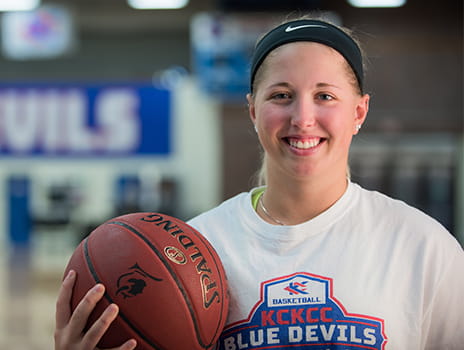February 22, 2019
Caroline Hoppock gets assist from sports neurologist
Caroline Hoppock, 19, can spin a basketball on one finger, hit a mid-range jumper and make a driving layup. After all, she's been practicing since she was 5.
At Olathe East High School, Caroline started on the varsity squad her sophomore through senior years. After her 2017 graduation, she signed on with the Lady Blue Devils at Kansas City Kansas Community College.
"I have the best teammates, my coach is phenomenal and I like going to college close to my mom and dad in Overland Park," says Caroline.
Freshman starter gets stopped
At the beginning of the 2017-18 season, Caroline helped her team achieve a 6-game winning streak. Then, on November 15, the Lady Blue Devils hit the road for an away game against North Arkansas College.
Caroline remembers every detail. "I was going up for a rebound and got tied up with another girl," she says. "I got an elbow to the nose, fell backward and hit my head on the floor. But I held on to the ball!"
When Caroline stood up, she had a bloody nose and a concussion. "I knew right away," she says. "I had a headache and saw stars."
The next day, the team returned to Kansas City, where Caroline took a computerized concussion evaluation. It measures attention span, memory, problem solving and reaction times. She scored dramatically lower than she had before the season began.
J.P. Darche, MD, is one of the team physicians for the Lady Blue Devils and a sports medicine physician at The University of Kansas Health System. He diagnosed Caroline with a concussion and restricted her activities until she was symptom-free. Once she started to feel better, she followed concussion guidelines to help her safely return to play.
Two steps forward, one step back
In December, Caroline was released to play and suited up for her first game back. She was only on the court a few minutes when she noticed things weren't right. "The headache came back," she says. "I felt slow and foggy."
Dr. Darche and the Lady Blue Devils head athletic trainer Rodney Christensen agreed that Caroline should pull back from team practice and play. She focused on light workouts and non-contact activity.
Around this time, she developed vertigo. Just lying in bed could cause the room to spin. Looking up and down from her notes to the front of her classroom made her dizzy and nauseated.
Caroline didn't know whether her symptoms were related to the concussion, being out of shape after not playing for several weeks, a recent head cold or her history of ear and vision problems.
Her ear, nose and throat physician at another healthcare facility treated her for ear and sinus infections. He then recommended vestibular therapy, an exercise program often prescribed for balance disorders. Sitting on the bench for the rest of the season was hard for her, and to make matters worse, her grades started to slip. "It was frustrating," she says. "I just wasn't 100%."
Dr. Darche remained in contact with Caroline's athletic trainer. They were concerned about her inability to make a full comeback. She could shoot a 3-pointer with no problem, yet she became dizzy when she drove to the basket and leaned her head back.
"As a sports medicine doctor and athlete, I've seen a lot of concussions," Dr. Darche says. "They're not always easy to diagnose. The symptoms are the same for a long list of other illnesses. And Caroline's case was complicated because she had several pre-existing ear and vision conditions."
It was time to call in a specialist.
Team support
When Caroline's symptoms did not completely resolve, Dr. Darche reached out to an expert at The University of Kansas Health System. He referred her to Michael A. Rippee, MD, a sports neurologist at The University of Kansas Health System.
Caroline's mom, Nancy, knew they were in good hands. "We are big believers in The University of Kansas Health System," Nancy explains. "My dad was there for 9 weeks with myasthenia gravis, and they saved his life."
Dr. Rippee addressed Caroline's neurological symptoms. He said she probably experienced both a head and neck injury. "If you move the head around enough to cause a concussion, you will probably move the neck around enough to damage it, and perhaps the spine, too," he says.
Some of the neurological wiring that contributes to dizziness and headaches is located at the top of the spinal column. Vestibular therapy or strenuous activity can aggravate the neck problem, making symptoms worse.
"Dr. Rippee was amazing," says Caroline. "He spent more than an hour with my mom, my team athletic trainer and me. He answered all our questions. After our appointment, I was no longer worried or scared. I was confident he could help me."
Dr. Rippee was amazing. He spent more than an hour with my mom, my team athletic trainer and me. He answered all our questions. After our appointment, I was no longer worried or scared. I was confident he could help me. – Caroline Hoppock





